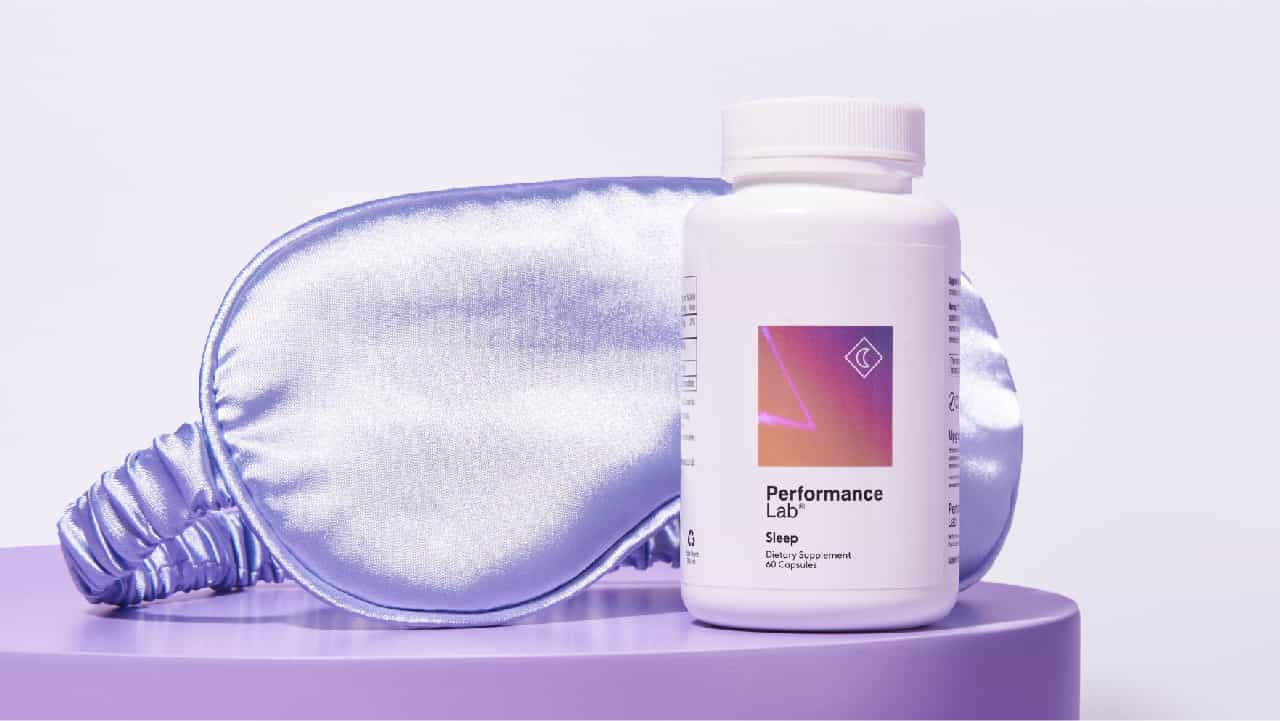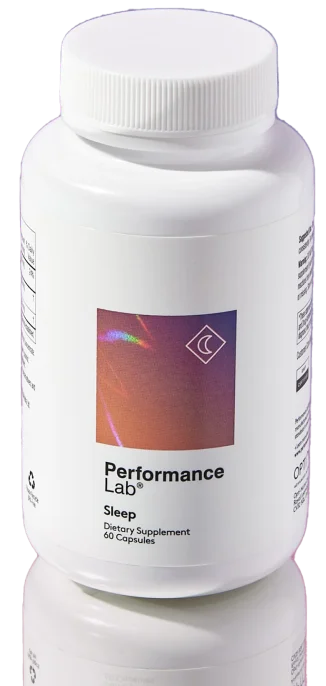Do you sleep like a log, or struggle to get to sleep? It can be a long night when you're tossing and turning, constantly checking the clock, and no amount of counting sheep will help.
More and more of us are finding ourselves wide awake when we should be sound asleep.
Around a third of American adults are suffering with acute insomnia right this moment, frustrating bouts of sleep loss lasting a few days each time. A tenth of us experience chronic insomnia lasting for three months or more, a few nights a week at a time. (1)
Even those of us who might not claim to have insomnia or a sleep disorder may still get insufficient sleep. Adults need, on average, seven hours or more a night for optimal health, but 40% of Americans get six hours or less. (2, 3)
Sleep deprivation causes all sorts of physical and mental health problems, so it makes sense that we're looking for natural sleep aids like lemon balm to help us to catch more Zzzs.
Introduction to Lemon Balm

Lemon balm, formal name Melissa officinalis, is a calming herb from the mint family. It has long been used in herbal medicine - we're talking back to the Middle Ages - for its anti-stress effects and to promote sleep, improve mood and more.
The name lemon balm might give off spa-day vibes, but it has generations of wisdom behind it.
Also known as garden balm, you'll find it sold in lemon balm supplements, capsules, as lemon balm oil, as dried powder, or as lemon balm leaves. You can also buy lemon balm tea bags, or make your own lemon balm tea using the leaves.
Lemon balm essential oils are also sold and used for skincare, but make sure to dilute with a carrier oil first unless ready-made.
But how can a simple herb from the mint family potentially help you to sleep? Let's investigate...
Using Lemon Balm Extract for Sleep
It's impossible to discuss Melissa Officinalis or lemon balm's effect on sleep without also talking about its anti-stress properties. The two are closely linked.
Indeed, it is lemon balm's potential ability to reduce stress and anxiety - which it does by slowing certain brain functions - that is thought to impact on sleep quality.
It makes sense that anything that helps to reduce anxiety and promote relaxation may also make it easier to fall asleep, so let's look at how it achieves that in more detail...
How Lemon Balm May Help Relieve Stress

This is a biggie and a popular use of lemon balm. Traditionally used anxiolytic botanicals (anti-anxiety plants) such as this are popular in integrative medicine.
Lemon balm works by increasing levels of GABA, full name gamma aminobutyric acid. GABA is a neurotransmitter that helps to block communication between hyperactive nerve cells associated with stress, anxiety and fear. Hence its description as a calming herb.
It's this essentially slowing down of certain brain functions that is thought to help sleep. Scientists are examining GABA's role for its potential use among insomnia patients. (4, 5)
Read more: Lemon Balm and Anxiety: A Natural Solution to Everyday Stress?
The Science on Lemon Balm and Sleep
Several studies have already examined lemon balm's influence on sleep. While more research still needs to be done, clinical trials so far show that taking lemon balm daily may help to:
-
Help you to fall asleep faster
-
Reduce any sleep disturbances
-
Boost sleep quality
-
Increase the total amount of time spent asleep. (6, 7)
A 2024 meta-study by Reading University in the UK - possibly one of the most comprehensive of its kind into lemon balm - agreed with the above. It concluded that the plant extract could be useful for:
-
Helping with anxiety
-
Improving a low mood
-
Helping to manage and possibly even prevent symptoms of sleep disturbance
-
Enhancing quality of life. (8)
As such, having a drink of lemon balm tea before bed or taking lemon balm supplements an hour or so before bed may help you gain a better night's sleep.
Best Lemon Balm Sleep Supplement

Lemon balm is included in our recommended natural sleep aid, Performance Lab Sleep. It is backed by magnesium, which helps to relax the muscles before bed. Also included is Montmorency tart cherry, which offers a natural low dose of 'sleep hormone' melatonin and tryptophan, a precursor to melatonin.
Together, they offer a clean label, quality natural sleep aid.


Other Potential Health Benefits of Lemon Balm
As we already know, lemon balm has long been used to help with stress and promote relaxation, as well as sleep. But it also has other potential benefits and uses.
Science has yet to investigate all of the historic uses of the lemon balm plant in herbal medicine, but here's what they have researched so far...
Lemon Balm May Boost Mood.

In clinical trials, lemon balm has been shown to help a whole range of mood-related issues. It has been shown to moderately reduce feelings of anxiety and to offer support for symptoms of depression. (9)
One three-week study with participants diagnosed with moderate depression, anxiety, stress or sleep issues showed improvements in all of the above scores. In addition, participants also cited improved mental wellbeing, affective state (emotional state), and quality of life. (10)
May Act as an Anti-Inflammatory and Antioxidant
-
Inflammation: Lemon balm is believed to carry anti-inflammatory properties, potentially helping to balance the enzymes that are involved in inflammation. (11)
-
Oxidative Stress. Lemon balm acts as an antioxidant, thanks to its essential oils, flavonoids and phenolic compounds. These anti-oxidant properties may help to fight the damage caused by oxidative stress and free radicals. Why is this important? Because doctors link oxidative stress to a whole range of diseases and conditions, such as arthritis, cancer, Alzheimer's disease, cardiovascular disease and more. (12, 13, 14)
May Help Reduce Cholesterol.
A meta-analysis of the herb suggested that it could possibly reduce 'bad cholesterol' (LDL cholesterol), reducing total cholesterol. A serum lipid profile after taking lemon balm showed it also reduced triglyceride levels. (15)
Does Lemon Balm Help Cognitive Function?

Mood and cognitive performance often go hand in hand, and there is some evidence that lemon balm can influence both.
Scientists theorise that the Rosmarinic acid found within lemon balm leaves may offer neuroprotective benefits for the brain, possibly because of its anti-inflammatory and antioxidant properties.
Studies show it also helped to support working memory in rats. Lemon balm's effect on cognitive function may also be attributed to its ability to reduce anxiety and promote relaxation. More research on human subjects is welcome. (16)
Lemon Balm and Cold Sores.
Topical lemon balm cream has traditionally been used to treat cold sores caused by the herpes simplex virus. Scientific trials have shown that it may help to support healing and reduce the pain of cold sores more than a placebo. It is worth noting, however, that these tests didn't compare lemon balm against prescription medicines or antivirals. (17)
-
Bloating and Digestion Issues. Lemon balm is often added to natural remedies in herbal medicine for bloating and mild stomach issues. (18)
-
Menstrual cramps. A small study of college-aged women showed that lemon balm helped to reduce PMS symptoms and menstrual cramps. Further research is encouraged. (19)
How to Use Lemon Balm

It's easy to add lemon balm to your daily routine.
You can find lemon balm-containing foods or add lemon balm leaves to food; search for lemon balm recipes online.
Alternatively, you can make lemon balm tea using ready-made lemon balm tea bags or stewing your own leaves or dried herb. Recommended dosage for tea: 1-3 times a day (using 1.5–4.5g of the herb in 150 ml of hot water).
Some people use lemon balm oil or essential oils topically, or prefer liquid extract or a tincture.
Recommended dosages: Liquids 1-3 times a day (2-4ml): tinctures 1-3 times a day (2-6ml).
Perhaps the easiest way to add lemon balm to your day is to take it in capsule form with dosages already worked out for you. (20)
Potential Interactions and Side Effects
Lemon balm has been used for centuries with few side effects. It is categorised as a class one drug by the Herb Society of America, meaning it should be safe to consume when used correctly. (21)
It is also on the Generally Recognised as Safe list by the FDA. (22)
It's safe to say it has a strong safety record, and most people will have no problems taking lemon balm. That said, it does have the potential to interact with some medications, such as thyroid medication, HIV medication, and SSRIs. You should also avoid sedatives and alcohol, as lemon balm has a sedative effect.
Side effects of lemon balm are few and usually mild, while allergic reactions are rare but may happen.
Potential side effects - most often caused by taking too high doses of lemon balm - include dizziness, increased appetite, stomach pain, wheezing, headache, nausea, vomiting and diarrhea. These are most often temporary and mild.
Topical lemon balm may cause skin irritation in some people.
Be aware that taking lemon balm may cause reduced alertness.
Pregnant and breastfeeding women should also avoid lemon balm due to a lack of research on its safety.
Please consult with a healthcare professional before using lemon balm if you have certain health conditions or are taking medications.
Final Thoughts
Lemon balm is an interesting herb with a long and impressive history. Clinical trials support its use as a stress reliever and to reduce symptoms of anxiety and possibly depression. It also shows significant promise for sleep and various other health conditions.
Its potential is often amplified when used alongside other herbal remedies or herbal combination products. Or when it's added to ready-made stacks such as Performance Lab Sleep.
In today's stressful world, we appreciate any natural option to help reduce anxiety, soothe our nerves, and help us gain a better night's sleep.















